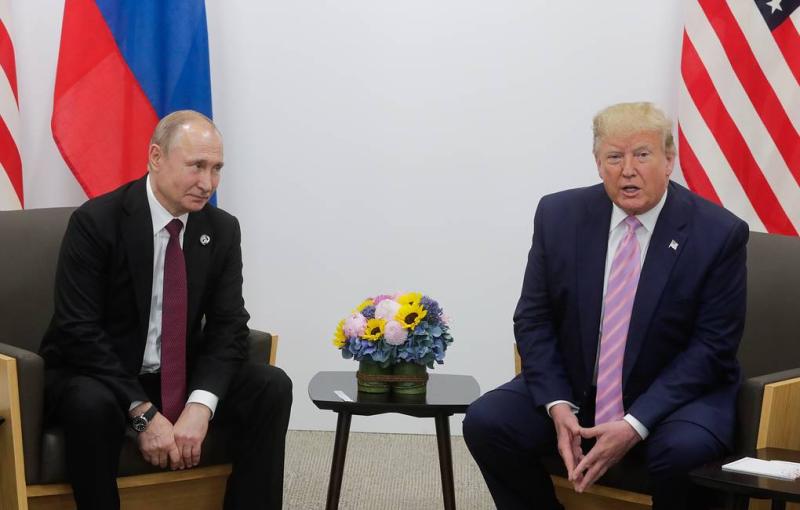
Middle East countries are the most likely venues for a meeting between Vladimir Putin and Donald Trump; the cause of Wednesday’s plane crash in Kazakhstan remains under investigation; and Hamas, Israel continue to blame each other for the stalemate in negotiations. These stories have topped Thursday’s newspaper headlines across Russia, according to TASS news agency.
Izvestia: Middle East countries most likely to host Putin-Trump meeting
Switzerland is ready to host talks between Vladimir Putin and Donald Trump, the Swiss Foreign Ministry’s spokesman confirmed to Izvestia. However, Moscow will hardly agree to that because Switzerland has lost its neutrality. Experts see Qatar, Saudi Arabia, and the United Arab Emirates as the most likely host countries.
The likelihood of a Putin-Trump meeting taking place in a European Union country is low due to Brussels’ attitude toward efforts to promote a peaceful solution initiated by some of the EU member states, namely Hungary. A country’s affiliation with the International Criminal Court (ICC), which earlier issued an arrest warrant for the Russian president, may be another important obstacle.
It is the Middle Eastern nations—Qatar, the UAE, or Saudi Arabia—that are capable of providing a truly neutral platform for talks. On the one hand, they do not acknowledge the ICC’s jurisdiction, and on the other, they have been actively mediating between Moscow and Kiev, particularly in facilitating exchanges of prisoners of war.
Qatar is the most likely candidate to host a Putin-Trump meeting, Middle East expert Leonid Tsukanov said. He points out that Doha has played a major role in the Gaza-related diplomatic process, which matters greatly to the US. "The UAE is a less likely option. Abu Dhabi has strong ties with Russia and the US, but it also benefits from their ongoing confrontation, acting as a temporary haven for the companies hit by sanctions, and the UAE will hardly be willing to change the status quo," Tsukanov noted.
Yelena Suponina, political scientist and Middle East expert, believes that Qatar, the UAE, and Saudi Arabia are equally well-positioned to host a meeting between the two leaders. "They are rich monarchies, and Trump is known for his love of rich countries. The capacities of the three above-mentioned monarchies will definitely be used for arranging some consultations on the issue," she explained.
Finally, Turkey is also a candidate to consider. In the spring of 2022, it was in Istanbul that Russia and Ukraine resumed their talks, which had kicked off in Belarus. The Turkish leadership maintains working contact with both Russia and the West, Ilya Vedeneyev, Middle East expert and lecturer at the Financial University under the Government of the Russian Federation, clarified. "Second, the Turkish government, namely President Recep Tayyip Erdogan, is promoting Turkey as an active participant in international relations capable of playing the role of mediator in conflicts between other countries as it lies between the East and the West," the analyst concluded.
Media: Experts look into various possible causes of Kazakhstan plane crash
A fuel shortage, a technical malfunction, and an oxygen tank explosion were listed among the possible causes of the passenger plane crash that occurred in Kazakhstan on December 25. Russia’s aviation authority said in its initial assessment that Azerbaijan Airlines’ Embraer 190 aircraft could have crashed near the city of Aktau because of a bird strike, which prompted the crew commander to divert to an alternate airport. There were 62 passengers, including 16 Russians, and five crew members aboard the flight; 32 people survived the crash, according to reports received by Thursday evening, Izvestia writes.
Experts interviewed by Izvestia don’t rule out that the plane crash could have been caused by a fuel shortage. "After signaling an emergency, the plane crossed the Caspian Sea, and nothing prevented it from doing that. However, it’s clear that neither of the engines was running at the final stage of the flight, during landing," said Yury Sytnik, who holds the title of Russia’s Distinguished Pilot. "Experts need to check how much fuel was loaded onto the plane to figure out if it could have been exhausted while crossing the Caspian Sea on its way to Kazakhstan’s Aktau," the expert said. The failure of both engines at once could have been caused by various factors, including fuel issues and clogged filters, the pilot noted.
A bird strike could not have led to a crash like that, experts say. Planes usually encounter birds at lower altitudes, up to 500 meters. Still, even if a flock of birds collided with the aircraft at the flight level, it would not have caused it to crash immediately. "The flight requested an emergency landing while still at the flight level," Andrey Patrakov, aviation expert and founder of the RunAvia flight safety and certification service, said. "That said, something happened at a high altitude," he added.
Vadim Lukashevic, aviation expert and former designer for the Sukhoi design bureau, was skeptical about the theory of an oxygen tank explosion in a conversation with Rossiyskaya Gazeta. "The aircraft cabin is not equipped with oxygen tanks; I mean, there aren’t any permanent oxygen supplies. As for passenger masks, oxygen is not delivered from a reservoir but produced in a chemical reaction," the specialist explained.
Forensic experts will have to examine the remains of the aircraft and study flight data recorders before establishing the definitive cause of the tragedy.
Media: Hamas, Israel blame each other for prolonged talks
Hamas announced on December 25 that the Israeli government had put forward more conditions, delaying the negotiation process. According to the Israeli media, it is the Palestinian movement that is complicating efforts to achieve a deal by refusing to provide a comprehensive list of the hostages that are still alive. The talks on a ceasefire in the Gaza Strip and the return of Israeli hostages have faced hurdles. Although the media reported a week ago that the parties had almost reached the final stage of negotiations, optimism has waned, Izvestia writes.
"The main issues stem from the certain realities on the ground that Israel relies on. Strong pressure is coming from those who would like to redraw the country's borders in Gaza and even in the West Bank. That said, it is about a long-term interest that is at odds with United Nations’ documents and the positions of other countries, including Russia," Andrey Baklanov, deputy chairman of the Association of Russian Diplomats and Higher School of Economics professor, pointed out. It’s hard for Hamas to determine a strategy because various factions of the movement have a divergent understanding of the situation, but no serious and long-term decisions have been made so far, Baklanov said.
Judging by media reports, Hamas has abandoned its demand for Israel to withdraw troops from the Gaza Strip at the first stage, but the movement seeks guarantees that this condition will be implemented at subsequent stages of the deal. Apparently, Israel’s military achievements in the fight against the pro-Iranian "Axis of Resistance" are the main reason driving Hamas to make concessions. The weakening of Hezbollah, the loss of Syrian influence, and the election of Israeli Prime Minister Benjamin Netanyahu’s closest ally Donald Trump as US president are among the factors that have complicated the situation for Hamas.
Meanwhile, the Israel Defense Forces (IDF) stands ready for a massive strike on Yemen, Nezavisimaya Gazeta writes. In contrast to the declining activities of Iran’s other allies in the Middle East, the Yemen-based Ansar Allah (Houthi) movement has recently increased missile strikes on the Israeli state. Israel will probably target senior Ansar Allah members along with the movement’s military infrastructure facilities. However, destroying the Houthis’ underground communications network will require a lot of effort from Israel. For now, Israel has launched a diplomatic offensive, particularly by promoting the idea of designating Ansar Allah as a terrorist organization.
Izvestia: Russia makes achievements as CIS chair in 2024
The combined GDP of the Commonwealth of Independent States (CIS) countries is expected to grow by 4.7% in 2024, which is above the projected global average, Russian President Vladimir Putin said at an informal meeting of CIS leaders on December 25, as reported by Izvestia.
The CIS currently comprises 11 countries: Armenia, Azerbaijan, Belarus, Kazakhstan, Kyrgyzstan, Moldova, Russia, Tajikistan, Turkmenistan, Ukraine, and Uzbekistan. However, Moldova and Ukraine have largely ceased participating in the group’s activities. Almost all leaders gathered in St. Petersburg, Russia, for the informal summit, except for Armenian Prime Minister Nikol Pashinyan, who had tested positive for COVID-19, and Azerbaijani President Ilham Aliyev, who had to return home due to a passenger plane crash.
The summit’s focus was on evaluating the outcome of Russia’s CIS chairmanship. Putin highlighted that Moscow had prioritized economic cooperation. The share of national currencies in trade payments between the member states has exceeded 85%. Ten years ago, this share was below 15%, economist Valery Karneyev noted. The use of national currencies helps companies keep their money safe because access to US dollars and euros may be blocked for any arbitrary reason, making it impossible to recover the funds, the expert explained. Additionally, personal sanctions could be imposed on the heads of companies engaging in such transactions. Payments in national currencies enable businesses to bypass these risks.
Other important areas of progress include efforts to enhance cooperation in combating extremism, cross-border crime, and drug trafficking. According to Putin, the member states have established strong lines of communication between law enforcement agencies.
Tajikistan, which will assume the group’s chairmanship on January 1, 2025, is expected to continue addressing these priorities, experts say. "Next year, Tajikistan will need to focus on achieving the goals that Russia set this year. The 30 years of the CIS have demonstrated that integration is particularly effective in Central Asia, so it will be necessary to leverage Tajikistan’s experience, as the country is one of the most active participants in Russia’s integration projects within the former Soviet space," Yevgeny Semibratov, deputy director of the Institute for Strategic Studies and Forecasts at Peoples' Friendship University of Russia, observed.
Kommersant: Russian gas production to exceed last year’s levels in 2024
Russia’s gas production rose by 7.9% from January to November, driven by rising exports and domestic consumption, Kommersant writes, citing sources familiar with the Energy Ministry’s statistics. The Gazprom gas giant has been the main driver of increased output this year.
Notably, Russia remains one of the leading gas suppliers to the European Union, in terms of both pipeline and liquefied natural gas (LNG), with the country’s share standing at about 15%.
Deputy Prime Minister Alexander Novak announced earlier that Russia’s overall gas exports to EU countries would exceed last year’s levels by 18-20%. For now, Gazprom continues gas transit via Ukraine and through the TurkStream pipeline, which enables the company to maintain production. However, Ukraine gas transit is expected to cease on January 1, 2024, which could result in Russian gas supplies being halved.
Vitaly Yermakov of the Higher School of Economics expects gas output to grow by 54 billion cubic meters, reaching 691 billion cubic meters in 2024.
The expert attributes the growing production to increases in exports and domestic demand. According to him, exports are rising primarily due to supplies to China via the Power of Siberia pipeline. Russian pipeline gas exports to China are expected to reach 31 billion cubic meters by the end of the year.
According to the analyst’s estimates, the overall pipeline gas supplies to non-CIS nations, including China, Turkey, and European countries, will stand at 85 billion cubic meters.
On the domestic market, gross consumption has surpassed 500 billion cubic meters, Yermakov added. He predicts that Gazprom’s production will reach about 400 billion cubic meters in 2024, reflecting a year-on-year increase of 11%. Gazprom’s strong performance partially offsets a decline in gas production by oil companies, which is expected to drop by about 6% year-on-year, the expert noted.
TASS is not responsible for the material quoted in these press reviews









